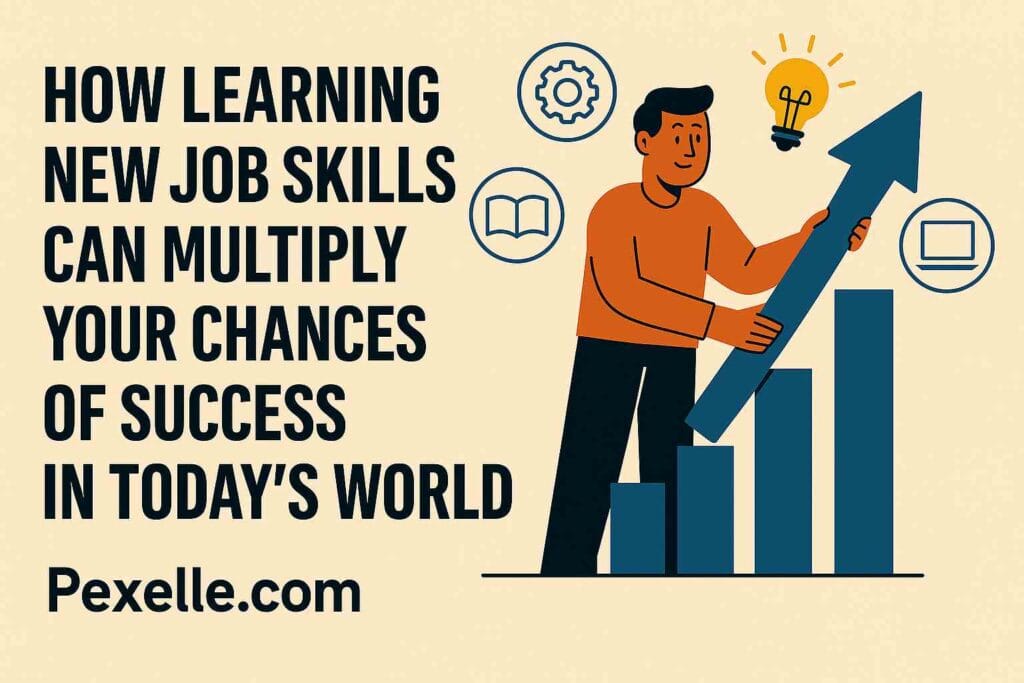How Learning New Job Skills Can Multiply Your Chances of Success in Today’s World

In the fast-paced and constantly evolving job market of today’s world, the ability to learn new skills is not just an advantage; it’s a necessity. Whether you’re a fresh graduate entering the workforce or an experienced professional aiming to stay competitive, learning new job skills is one of the most effective ways to increase your chances of success. Here’s how:
1. Adapting to Changing Technology
One of the biggest drivers of change in the workforce today is technology. Automation, artificial intelligence (AI), machine learning, and new software tools are transforming industries across the globe. By continuously upgrading your skills to stay aligned with technological advancements, you position yourself as a valuable asset to employers.
For example, someone working in marketing might learn data analytics tools to interpret customer behavior better. Similarly, a professional in healthcare could acquire knowledge in telemedicine technologies. By embracing such technological changes, you not only future-proof your career but also stand out in a crowded job market.
2. Improving Job Performance and Efficiency
When you learn new skills, you can improve your current job performance. Gaining expertise in tools, processes, and techniques relevant to your field allows you to work more efficiently and effectively. For instance, mastering a new project management software can help you manage tasks better, collaborate more effectively with team members, and meet deadlines with ease.
Improving your performance leads to higher recognition in the workplace, more responsibilities, and potentially promotions. Employees who are continuously developing their skills are often seen as proactive and capable, which can result in better job security and career advancement.
3. Expanding Career Opportunities
Learning new skills broadens your career options. If you’re in a job or industry that’s starting to lose demand or become obsolete, acquiring new skills opens doors to different roles and sectors. For instance, someone working in traditional retail could learn e-commerce management, opening up opportunities in the rapidly growing online retail industry.
Moreover, many industries now require hybrid skill sets that combine expertise from multiple fields. Professionals who can blend skills, such as technical expertise and communication abilities, are in high demand. By broadening your skills, you make yourself more versatile and flexible, capable of stepping into a variety of roles across different industries.
4. Enhancing Your Network and Connections
Learning new skills often involves engaging with different professional communities, attending training programs, or joining specialized groups. This interaction not only helps you grow your knowledge but also expands your professional network. Connecting with like-minded individuals, experts, and potential mentors can create opportunities for collaborations, partnerships, or job offers.
A solid professional network is an invaluable resource for career development. You never know when a new connection will lead to your next job opportunity or collaboration, so taking part in educational events or workshops can significantly enhance your career prospects.
5. Building Confidence and Motivation
When you acquire new skills, you naturally gain more confidence in your ability to handle complex tasks. This self-assurance not only makes you more effective in your work but also enhances your overall job satisfaction. The more competent you feel, the more motivated you’ll be to take on challenges and pursue new opportunities.
As you achieve mastery in various areas, you’re likely to feel more engaged in your work, which can lead to a greater sense of fulfillment and career satisfaction. A motivated and confident employee is often seen as a leader or high performer, paving the way for greater career success.
6. Staying Competitive in the Job Market
The job market is more competitive than ever before. With globalization, remote work opportunities, and a larger talent pool, it’s crucial to set yourself apart from others. By constantly learning and developing new skills, you ensure that you remain relevant and marketable to employers.
Whether you’re seeking a promotion, changing industries, or just trying to stay ahead in your current role, investing in your personal and professional growth through skill-building is one of the most effective ways to keep up with the competition.
7. Personal Growth and Job Satisfaction
Beyond professional advantages, learning new skills can lead to personal growth. Gaining knowledge, acquiring expertise, and mastering new areas of interest can provide a sense of accomplishment and fulfillment. This personal growth often translates into better job satisfaction and a stronger sense of purpose in your career.
When you feel you’re continually growing, you are more likely to stay motivated, engaged, and excited about your work. This positive mindset can improve not only your professional success but also your overall well-being.
Conclusion
In today’s rapidly evolving world, the ability to learn new job skills is crucial for success. Whether you’re improving your performance, expanding your career opportunities, or staying competitive in the job market, continuous learning provides you with a significant edge. So, make it a point to invest in your skills—attend workshops, take courses, and remain open to new experiences. The more you learn, the greater your chances for long-term success and fulfillment in your career.
Source : Medium.com




